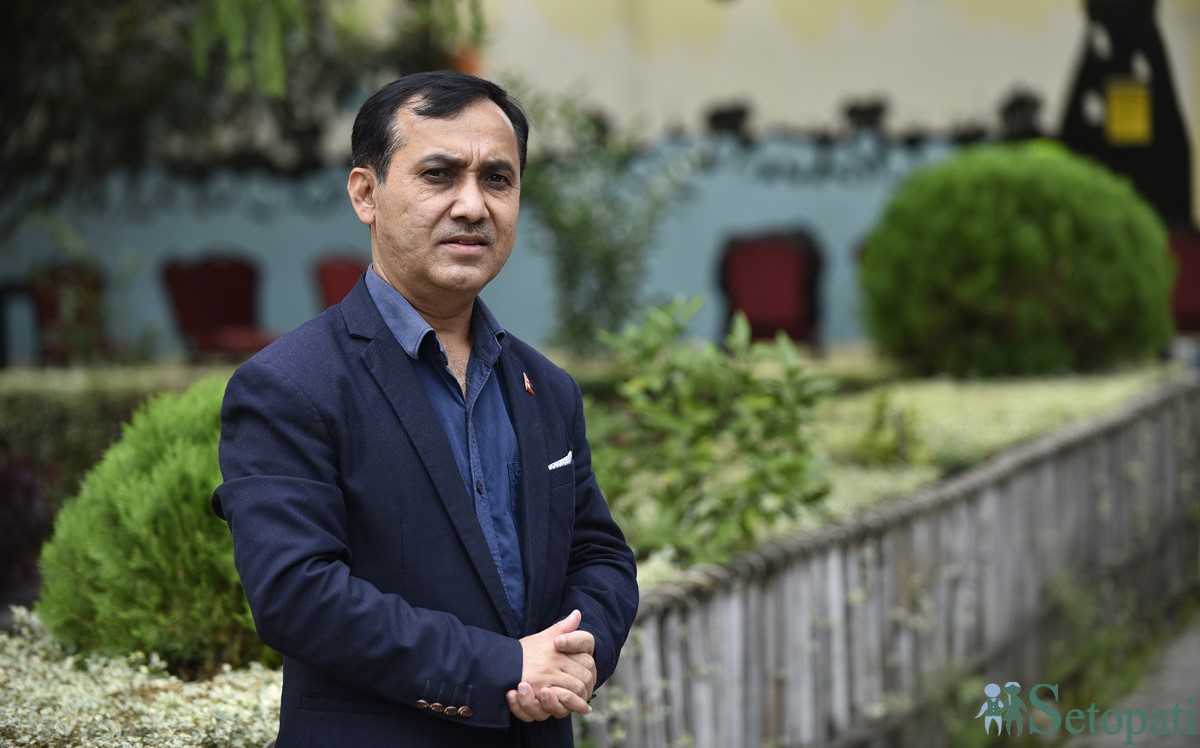Nepali Congress (NC) General Secretary Bishwa Prakash Sharma is preparing to contest the upcoming parliamentary election from Kathmandu.
Sharma is holding discussions on contesting the election from Kathmandu Constituency No. 5, a leader close to him told Setopati.
Prakash Sharan Mahat was the NC candidate from Kathmandu-5 in the 2017 general election. He lost to Ishwar Pokharel of CPN-UML.
Sharma had contested the election from Jhapa Constituency No. 1 then. Ram Karki of CPN (Maoist Center) defeated him. Karki secured 36,173 votes while Sharma received 33,310 votes.
CPN-UML and CPN (Maoist Center) had forged a left alliance for the election.
Sharma wants to contest the election from Jhapa-1 this time too but it is not easy for him there, said the leader close to Sharma.
“His first priority is to contest and win the election from Jhapa-1 itself. But if attempts are made to stop him there, he could contest from Kathmandu-5 too,” said the leader. “There is no internal unity in Congress in Jhapa. This could put General Secretary Sharma in difficulty.”
Relations between Sharma and former general secretary Krishna Prasad Sitaula have not been good for a long time. Both groups will try to stop each other, said the source.
Sharma had met Sitaula and sought his blessings after becoming the party’s general secretary, but that too did not help improve their relations.
Sharma is hesitant to contest the election from Jhapa-1 this time since the Sitaula group appears unlikely to support him openly.
Relations between the two were not good even in the recent local elections. Sharma and Sitaula were engaged in a power tussle over the party’s mayoral candidate in Sharma’s hometown Mechinagar.
The party had originally given the ticket to Keshav Raj Pandey, who is close to Sitaula, but Indra Bahadur Budhathoki got the ticket after Sharma’s alleged intervention. Budhathoki lost the election to UML.
The five parties in the ruling coalition have agreed to forge alliance in the November-20 elections. As per the agreement, they have formed an 11-member task force to finalize the sharing of seats.
As Sitaula is the coordinator of the task force, he could lobby to deny Sharma ticket under the first-past-the-post electoral system or agree to leave the constituency to the Maoists, said the source close to Sharma.
The NC parliamentary board distributes tickets for the elections and Sharma will also be on the board. If there are plots from within the party to defeat him, he is likely to contest the election from Kathmandu-5.
NC is the second largest party after CPN-UML in Kathmandu-5 based on the number of votes received by the candidates for ward chair in the recently held local elections.
Ward chair candidates from UML received 19,703 votes in this constituency while those from NC got 14,853 votes.
Similarly, Rastriya Prajatantra Party received 2,822 votes, CPN (Unified Socialist) got 1,827 votes and CPN (Maoist Center) secured 1,168 votes. Candidates from other parties received 1,315 votes.
The five-party coalition trails UML by nearly 2,000 votes when their total votes are combined. Sharma believes he can get those votes on the strength of his popularity.
Sharma lost to Ram Karki, who was the common candidate of the left alliance, in Jhapa-1 by 2,863 votes in the 2017 general election.
Here, too, NC trails far behind UML in terms of votes received in this year’s local elections. UML received 31,232 votes while NC got only 24,059 votes.
Maoist Center received 3,995 votes and Unified Socialist got 1,252 votes. RPP secured 6,922 votes while Janata Samajwadi Party could manage only 69 votes. Independent candidates got 2,256 votes.
The total number of votes received by NC and other coalition partners is around 29,000, which is still 2,000 short of UML’s total. UML appears likely to get more than 36,000 votes if it were to form an alliance with RPP.
Based on these numbers, Kathmandu-5 looks like an easier prospect than Jhapa-1 for Sharma this time around.

